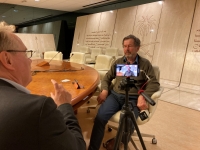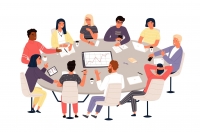News

14/04/2023
Following the recent release of an FAO/WHO report on the food safety aspects of cell-based food, we spoke with one of the lead authors to find out more. Here is what FAO Food Safety Officer Masami Takeuchi shared.
Have you identified any new food safety risks or hazards?
First of all, the terms “risk” and “hazard” have completely different meanings, thus it is important to make a clear distinction. A hazard is a potential danger (e.g. substance), the risk is determined whether we humans are exposed to such hazards (i.e. likelihood). A common example is electricity in our houses. The voltages...

06/04/2023
After the latest ad hoc Joint FAO/WHO Expert Consultation on Risk Assessment of Food Allergens, we had a chance to have a quick chat with Simon Brooke-Taylor, who chaired the meeting. Brooke-Taylor, an expert in food allergens, provided some insights on this area of study and on what we can expect in the future when it comes to food allergies.
How has the science of food allergens been evolving?
We know a lot more about allergens, what causes them, how to detect them, maybe also how to protect people from them.
How did you become an expert in food allergens?
I'm a regulatory affairs...

05/04/2023
FAO, in collaboration with the World Health Organization (WHO), published its first global report on the food safety aspects of cell-based food today. The publication includes the results of an FAO-led expert consultation that was held in Singapore in November 2022, where a comprehensive food safety hazard identification was conducted. Hazard identification is the first step of the formal risk assessment process.
The publication was launched during a joint FAO/WHO webinar on 5 April 2023. It includes a literature synthesis of relevant terminology issues, principles of cell-based food production processes, the global landscape of regulatory frameworks and case studies from Israel,...

04/04/2023
FAO is pleased to announce its new roster of experts for the Joint FAO/WHO Expert Committee on Food Additives (JECFA) for the 2023-2027 period. A total of 133 international scientific experts from 34 different countries, representing all FAO regions, were selected in response to the call for experts issued in 2022. Approximately, 40 percent are female and 60 percent are male. The number of experts increased 58 percent compared to the previous roster.
Members of the roster will be considered for future activities of JECFA according to the expertise required and in accordance with the procedures described in the FAO/WHO framework for the provision of...

30/03/2023
Last week FAO began a project to improve the food control system in Rwanda. A 5-million-euro project funded by the European Union, "Strengthening of Capacities and Governance in Food and Phytosanitary Control,” is set to provide technical support and work with Competent Authorities and other leading institutions in 12 Common Market for Eastern and Southern Africa (COMESA) Member Countries to build up capabilities, strengthen governance and improve strategic planning around two main components: food safety and plant health.
As part of the food safety component, an assessment of the national food control system will be carried out in Rwanda. A team...

28/03/2023
FAO has released a brochure that provides an overview of its work on food safety, which is available in Arabic, Chinese, English, French, Russian and Spanish. The publication called Safe food for everyone – FAO’s work on food safety: science, standards and good practices can be downloaded as a pdf or read online as a digital report with links to videos and more in-depth content.
“We are delighted to share this publication that has benefited from the input of colleagues in numerous divisions and offices in a collaborative fashion – much the way we work on food safety itself,” said Markus...

28/03/2023
The Food Safety Magazine recently interviewed Vittorio Fattori, Food Safety Officer, and Keya Mukherjee, Food Safety Specialist, for their podcast entitled, “Preparing for Tomorrow’s Food Safety Risks, Today”
The podcast covers a number of areas that are included in the publication Thinking about the future of food safety – A foresight report (2022). These areas are new foods, climate change, emerging contaminants, urban food systems, and plastic packaging with a circular economy focus.
Mukherjee discussed the various potential health risks associated with edible insects, cell-based food, and seaweeds. She outlined some of the greatest threats to food safety from a warming...

27/03/2023
“The food of one may be poison to others" - Lucretius, Roman philospher.
Food allergies are a result of the body’s immune system developing antibodies in response to proteins present in food. With effects impacting the digestive tract, the skin and the respiratory system, the symptoms of food allergies vary from mild to severe. Globally, over 220 million people must avoid certain foods because of allergies.
To leverage scientific knowledge for action on allergens, the FAO and WHO Scientific Advice Programme teams collaborated with the Codex Committee on Food Labelling (CCFL) in hosting a webinar about the outcomes of the food allergen...

24/03/2023
New scientific evidence has become available over the last two decades about the risks and benefits of fish consumption and there is a need to update the Joint FAO/WHO report of the expert consultation that took place in 2010. For this reason, FAO and WHO are looking for experts in nutrition, toxicology, epidemiology, dietary exposure, and risk-benefit assessment among others to review data on levels of nutrients and specific chemical contaminants in a range of fish species, as well as recent scientific literature covering the risks and benefits of fish consumption. These experts will be part of a multidisciplinary team...

23/03/2023
Taking into account the global context, the emerging drivers and trends with implications for food safety, FAO developed a set of strategic priorities with the vision to provide “Safe food for all people at all times”. The mission, also specified in the newly released FAO strategic priorities for food safety 2022-2031, is: “To support Members in continuing to improve food safety at all levels by providing scientific advice and strengthening their food safety capacities for efficient, inclusive, resilient and sustainable agrifood systems.”
The FAO strategic priorities for food safety were developed through a consultative process with FAO Members, international partner organizations (IAEA,...
Stay up to date and connect to our RSS feed!
